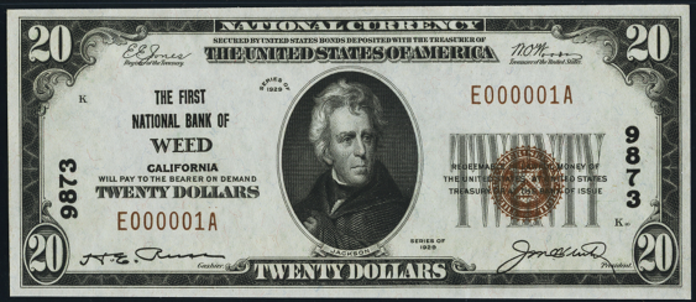Twenty Dollar Notes › Nationals › 1929 Twenty Dollar National Bank Notes › Kentucky Charters › 1929 $20 Olive Hill Kentucky Olive Hill National Bank
Get Value Now
| Item | Info |
|---|---|
| Series | 1929 |
| Charter | #7281 Olive Hill National Bank of Olive Hill, Kentucky |
| Year Chartered | 1904, 460 Banks Chartered |
| City Info | Olive Hill is a home rule-class city along Tygarts Creek in Carter County, Kentucky, in the United States. The population was 1,599 during the year 2010 U.S. Census. Olive Hill began as a rural trading post established by the Henderson brothers in the first part of the 19th century. Although Olive Hill was allegedly named by Elias P. Davis for his friend Thomas Oliver, there is no evidence to support this popular contention. In 1881, the town was moved from a hillside location to the current location in the Tygarts Creek valley, where the Elizabethtown, Lexington and Big Sandy Railroad had laid tracks. The hillside location become known as Old Olive Hill and now serves as the city's residential area. On March 24, 1884, Olive Hill incorporated as a city and served as the county seat of the short-lived Beckham County from February 9 to April 29, 1904. Source: Wikipedia |
| Similar Cities | City name is unique, no others like it. |
| Seal Varieties | Small Brown |
| See Also | If your note doesn't match try: 1. 1929 $20 Federal Reserve Bank Note 2. 1928 $20 Federal Reserve Note 3. 1928A $20 Federal Reserve Note 4. 1928B $20 Federal Reserve Note 5. 1928C $20 Federal Reserve Note 6. 1934 $20 Federal Reserve Note |
| Other Info | 1. Value depends on notes known for charter, condition and market demand. |
| Neat Fact | Notes from common charters are less valuable compared to rarer charters. Value also depends on type, denomination and total notes known for city, state and region. Ultimate determination of value is collector demand. |
No Obligations Offers and Appraisals
Please submit a good photo or scan. It will be identified and evaluated. Understand there may be subtle differences between the image you see above and your note. Signatures, design, markings and note condition will determine the offer price. Notes in Uncirculated or better condition receive the best offers.
Appraisals can be estimated for wholesale and retail prices. Wholesale is what dealers typically pay. Retail is what a collector might pay. Retail is slightly higher in most cases.
Please visit this page for USA Paper Money Reference. Do not treat this page as a reference guide, it is for appraisal and acquisition purposes only.
